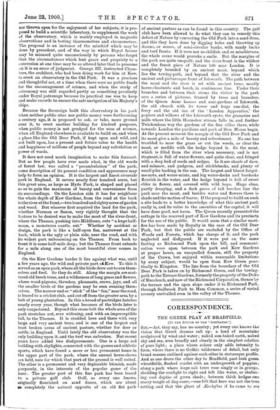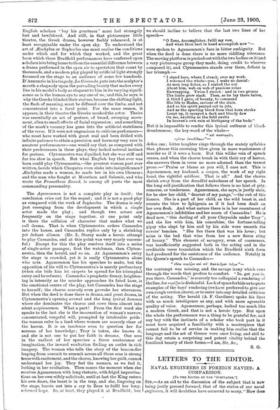CORRESPONDENCE.
THE GREEK PLAY AT BRADFIELD.
[TO THE EDITOR OP THE "SPECTATOR."]
Sra,—Art, they say, has no country; yet every one knows the vision that Greek dramas call up : a land of mountains sculptured by wind and water ; naked sun-baked earth, naked sky and sea, seen broadly and clearly in the simplest relation of pure light; a place where colour only adds intensity to form, where there is no Gothic wilderness of detail, but only broad masses outlined against each other in statuesque profile. And as one drove the other day to Bradfield, past lush green wheatfields, flushed scarlet with an undergrowth of poppies; along a park where huge oak trees rose singly or in groups, shedding the sunlight to right and left like water, or shelter- ing cool depths of green shade ; between thick hedges one starry tangle of dog-roses,—one felt that here was not the true setting, and that the ghost of .Eschylus if he came to see English scholars " boy his greatness " must reel strangely lost and bewildered. And still, in that picturesque little theatre, the Greek drama; however feebly rehearsed, is at least recognisable under the open sky. To understand the art of 2Eschylus or Sophocles one must realise the conditions under which and for which they worked, and the great boon which these Bradfield performances have conferred upon scholars is to bring home to them the essential difference between a drama performed in the open air to spectators that count by thousands, and a modern play played by artificial light strongly focussed on the stage to an audience of some few hundreds. D'Annunzio in his tragedy, La Gioconda, puts into the sculptor's mouth a rhapsody upon the pervading beauty that makes every line in his model's body as eloquent to him in its varying signifi- cance as is the human eye to any one of us; and this, he says, is why the Greeks blinded their statues, because the shifting light, the flash of meaning, must be diffused over the limbs, and not concentrated into a focal point. For the same reason, it appears, in their theatre the Greeks masked the actor. Theirs was essentially an art of gesture, of broad, sweeping move- ment, alien to small effects of facial expression ; and something of the mask's vacancy has gone into the artificial stateliness of the verse. If it were not ungracious to criticise performers— who must have worked with great zeal and been drilled with infinite patience to attain a precision and harmony very rare in amateur performances—one would say that, as compared with their predecessors in these plays, they lacked natural instinct for gesture. Clytemnestra was dignified, but she was stiff and far too slow in speech. But what English boy that ever was born could play Clytemnestra,—the greatest woman, art ever written, beside which Cleopatra even sinks into insignificance P Aschylus made a woman, he made her in his own likeness ; and the man who fought at Marathon and Salamis, and who wrote the Prometheus Bound, is among all poets the most commanding personality.
The Agamemnon is not a complete play in itself ; the conclusion cries out for the sequel; and it is not a good play as compared with the work of Sophocles. The drama is only just emerging from the development in which a single actor made the play ; and though two actors are frequently on the stage together, at one point only is there the collision of character that makes what we call drama. That is when Clytemnestra orders Cassandra into the house, and Cassandra replies only by a shrinking yet defiant silence. (Mr. L. Starey made a heroic attempt to play Cassandra, and at this point was very nearly success- ful.) Except for this the play resolves itself into a series of single-actor passages; first the watchman, then Clytem- nestra, then the herald, and so on. At Agamemnon's entry the stage is crowded, yet it is really Clytemnestra alone who acts. Agamemnon has his speeches to make, but the opposition of his will to Clytemnestra's is merely perfunctory (when she bids him let carpets be spread for his triumphal entry and he refuses). Cassandra's prophetic frenzy, heighten- ing in intensity as the murder approaches its fated hour, is the emotional centre of the play, but Cassandra has the stage to herself ; the chorus scarcely even provoke her utterances. But when the deed is done there is drama, and great drama, in Clytemnestra's opening avowal and the long lyrical kommos where she dominates the chorus and cows them almost into silent acquiescence. What a part 1 From the first word she speaks to the last she is the incarnation of woman's narrow, concentrated, vengeful will, prompted by intolerable pride : the woman ruler in a land where women are scarcely clear of the harem. It is an insolence even to question her for sources of her knowledge; Troy is taken, she knows it, and she is not one to put her faith in dreams. One sees in the earliest of her speeches a fierce exuberance of imagination, the inward exultation finding an outlet in rich imagery. The woman who tells the story of the beacon-fire leaping from summit to summit across all those seas is strung tense with excitement, and the chorus, knowing her guilt, cannot understand her joy. They feel the menace, as we feel it, lurking in her exultation. Then comes the moment when she receives Agamemnon with long rhetoric, with frigid improvisa- tions on her own wifely solicitude, until at last the King enters his own doors, the beast is in the trap, and she, lingering on the stage, bursts out into a cry to Zeus to fulfil her long- schemed hope. So, at least, they played it at Bradfield; but we should incline to believe that the last two lines of her
speech— "O Zeus, Accomplisher, fulfil my vow,
And what thou halt in hand accomplish now "- were spoken to Agamemnon's face in bitter ambiguity. But when the deed is done there is no more riddling utterance. The moving platform is pushed ontwith the two bodies on it (and
a very picturesque group they made, doing credit to whoever composed it), and Clytemnestra stands over them, defiant in her triumph:— "I stand here, where I struck, over my work.
I schemed the whole—yea, I make no denial: As men trap fishes, so I staked the net About him, web on web of precious robes Enwrapping. Twice •I struck : and in two groans The limbs grew slack: Then, as he lay there fallen, A third I gave, of bounty, to commend His life to Hades, saviour of the slain.
And so his spirit panted out in jets, And as the spurting blood from that keen stroke Leapt up, it sprayed a dark and bloody dew On me, exulting as the field exults In heaven's own rain at birthpang of the buds."
But it is impossible to render this lyrical outburst of blood- drunkenness ; the key-word of the whole-
" Keil IFETTOIK6Ti Tp[7711, hrEwSfsidin "- defies one ; bitter laughter rings through the stately syllables that phrase this crowning blow given in mere wantonness of murder as if it were a boon. But this wilder vein of speech
ceases, and when the chorus break in with their cry of horror, she answers them in verse no more adorned than the tersest prose :—" Praise or blame as you will, I care not. This is Agamemnon, my husband, a corpse, the work of my right hand, the rightful artificer. That is all." And the chorus shrink away from the dreadful nakedness of her speech. In the long self-justification that follows there is no hint of pity, remorse, or tenderness. Agamemnon, she says, is justly slain, for he slew her child, " dearest of my pangs,"—the cub of this lioness. She is a part of her child, as the wild beast is, and resents the blow to Iphigenia as if it had been dealt on her own flesh. And what nature there is in her resentment of Agamemnon's infidelities and her scorn of Cassandra! He is dead now, " this darling of all your Chryseids under Troy " ; and she lies with him, his concubine, the fortune-telling gipsy who slept by him and by his side wore smooth the rowers' benches. " She lies there that was his lover ; but mine is the bed that wins from her a new fierce sting of luxury." This element of savagery, even of coarseness, was insufficiently suggested both in the acting and in the creditable verse translation which the Bradfield sixth form had produced for the assistance of the audience. Notably in the Queen's speech to Cassandra- " From KoatCou Kg.1 o Kaolf.;:Spap it.4-yo, "- the contempt was missing, and the savage irony which runs through the words that profess to comfort. " In, get you in,
you there, Cassandra," is scarcely too colloquial a rendering of the line, for zo,:ctou is disdainful. Lack of space forbids us to quote
examples of the boys' rendering (we have preferred to give our own rough version above), or to enter into any detailed criticism of the acting. The herald (A. F. Gardiner) spoke his lines with as much intelligence as any, and with more agreeable quality of voice. Agamennon, perhaps, looked too much like a modern Greek, and that is not a heroic type. But upon the whole the performance was a thing to be grateful for, and any boy with the instincts of a scholar who took part in it must have acquired a familiarity with a masterpiece that cannot fail to be of service in making him realise that the language and the art of Greece were once living, and still to this day retain a surprising and potent vitality behind the fossilised beauty of their forms.—I am, Sir, dec., S. G,



































 Previous page
Previous page